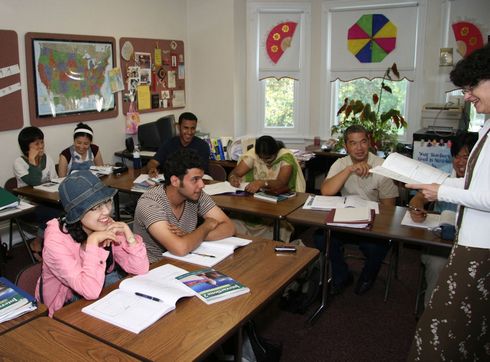32년 경력 미국 랭귀지 스쿨 전문가 Dr. Scott Sevens 의 조언 (한글) »
Dear Scott Stevens,
Hi. I am Daniel Kim from Korea.
I hope this reaches you well.
I was an ELI student at University of Delaware 14 years ago. (If I am right, it was from Aug. 1997.) I only remember your name and Wendy.
First and foremost, I really want to say Thank You for the great ELI program that I fully enjoyed back then.
I’ve received a UD ELI newsletter every year since then. Every time, I was just amazed to see you and some other teachers still working there. Whenever I saw your picture on the paper, it felt like taking me back in the days, 14 years ago. And I admire you making effort to help ELI students for that long period.
Until lately, I've never thought I could contact you in person. But who knows tomorrow, right?
Last year, I built a website for Korean English learners. (www.KoreanEnglish.org) The website is mainly designed to give useful information and advice to Korean English learners. One of the important things I've been doing is to introduce great learning materials or websites to them.
A couple of days ago, I wrote an article about what I learned while staying in the US and participating in the UD ELI program. In association with that, I'd like to post up an email interview with you, if you are available.
I know you're very busy with your business and individual life. However, if you have some minutes to spare for the interview, it will be much appreciated and I am honored to share it with others. I believe it will also increase prospective UD ELI students.
The interview has five questions. They are all about your advice on English learning and UD ELI program from your long-time experience.
1. What are the challenges most Korean ELI students struggle with?
2. For low level students, what do you recommend they should focus on in English learning? (For example, reading, speaking, listening, grammar rules, etc)
3. All the expenses ELI students need to spend are not small. How do you think the money could pay off in their future?
4. What makes the UD ELI program special, compared with others in the US?
5. What would be the five things UD ELI students should experience while they stay in Delaware?
I am going to post it up once I get the interview answers and let you see how the post looks like.
Once again, I am highly grateful for your consistent effort and inspiration for ELI students.
I wish you full of happiness and fulfillment in your life.
Sincerely yours,
Daniel Kim, Seoul
Dr. Scott Stevens
- ELI Director (English Language Institute), University of Delaware (UD)
- UD ELI에 1981년부터 근무 (32년 경력)
- 1984년부터 ELI Director로 현재까지 근무
View Scott Stevens' Profile at the UD ELI website »

Dear Daniel,
Thank you for your email and for your very kind comments. Congratulations on your new website! Today we are intaking new students, so I don’t have a lot of time. But let me give some brief responses to your questions below.
1. What are the challenges most Korean ELI students struggle with?
We find that many Koreans come well prepared to further their language skills, in part because of the excellent English training available in Korea, which probably does the best job of any non-Western nation in teaching English as a Foreign Language. Each student is an individual with individual challenges, but based on my many years of working with Koreans, I would say that many struggle most in the area of oral intelligibility. By that I mean, not simply pronunciation of the phonemes (sounds), but also intonation, fluency, projection, and the stress-timed rhythm of English.
2. For low level students, what do you recommend they should focus on in English learning? (For example, reading, speaking, listening, grammar rules, etc)
I believe that students should learn holistically. In other words, they should attempt to learn through all skills: reading, writing, listening, speaking, vocabulary, and grammar.
For example, students learn vocabulary much more quickly if they apply that vocabulary through a variety of skills. If they discover a new word in reading, they should practice pronouncing it, then listen for others to use it, and also try to use that word in their writing. By using vocabulary through different modalities, they will greatly improve their long term memory of that word.
However, the beginner learner is wise to spend more time on listening. That is the skill that precedes others and how we learned our first language. By practicing listening to native speech, English learners can begin to discern word separation, phrasing, and pronunciation.
3. All the expenses ELI students need to spend are not small. How do you think the money could pay off in their future?
Yes, it is true that studying in another country can be expensive. However, it is also true that numerous studies have shown a strong correlation between strong English skills and earning power—as well as opportunities for career advancement.
Even though Korea is home to some excellent language programs, there is no substitute for being immersed in a language 24 hours/day by living in the country of individuals whose native language is English—and to be surrounded by the many different accents and variations of English production.
4. What makes the UD ELI program special, compared with others in the US?
I have been humbled to hear the University of Delaware’s ELI described as one of the top intensive English programs in the United States.
What makes the program special?
First, our faculty are outstanding—highly trained and educated, leaders in the profession as trainers and authors, wonderfully creative, and caring deeply about the success of every student.
In addition, we may be among the very programs in the country that includes private tutoring as part of our program, at no additional charge. This helps to us to personalize and individualize instruction by caring professionals.
In addition, we have a terrific staff to help students in every aspect of their education: from admissions, to arrival and orientation, to housing, course registration, advising and counseling, and cultural programming.
We have state-of-the-art classrooms, with SmartBoards, plasma screens, and instructional command centers. We also have a beautiful self-access learning center with 70 computers and terrific language learning software.
Finally, and most importantly for me, we work hard to create a learning community. The ELI is really an extended family of individuals from all around the world—over 30 countries—all here to encourage and support each other in the development of language skills and cross-cultural understanding.
5. What would be the five things UD ELI students should experience while they stay in Delaware?
First, they should experience life on our wonderful campus at UD. We have concerts, college sporting events, festivals, and over 200 student clubs. Second, surrounding Newark are terrific parks for hiking, biking, picnics—and simply enjoying nature. Nearby New Castle is a beautiful historic town that dates to the 1,600s—a splendid place to learn about the early days of America. Fourth, our beaches are favorite destinations, with great boardwalks, restaurants, and surfing/swimming/sunbathing. Fifth, Winterthur Museum has an astounding collection of early American furnishings, with complete rooms to show life here from the 1600’s to the early 1900’s—all surrounded by a lovely garden.
All the best,
Scott S.
Scott G. Stevens, Ed.D.
Director, English Language Institute, College of Arts and Sciences
Coordinator, MA TESL Program, School of Education
University of Delaware
189 West Main Street - Newark, Delaware 19716 - USA
Phone: +1-302-831-2674
Fax: +1-302-831-6765
이 이메일 주소가 스팸봇으로부터 보호됩니다. 확인하려면 자바스크립트 활성화가 필요합니다.
www.udel.edu/eli
"Your home for excellence in English teaching."








![[대니얼의 15분 강의] 이사와 관련된 영어 표현](/images/2025/06/23/posting-expss-moving-20250623.jpg)
![[대니얼의 15분 강의] 휴대폰 관련 영어 표현](/images/2025/02/27/posting-main-20250227-mobile.jpg)
![[대니얼의 15분 강의] 반대 / 다른 의견 표현법](/images/2024/12/14/express-different-opinions-two.jpg)